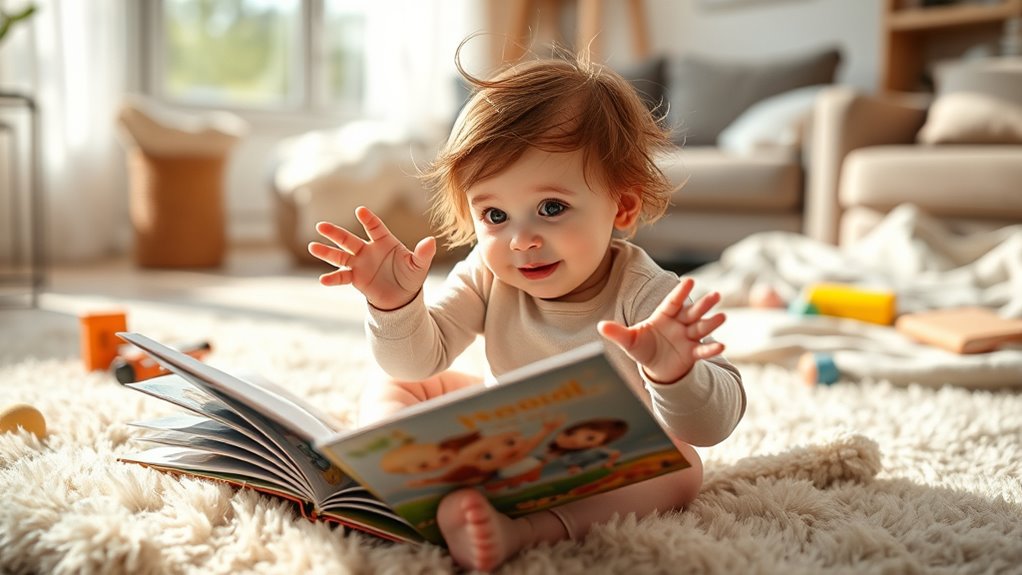Between 12 and 18 months, your child’s language skills develop quickly from babbling to using real words. They start connecting sounds with objects, responding to their name, and imitating familiar words. Social interactions like pointing, naming, and simple conversations boost their vocabulary and confidence. Repeating words and giving positive feedback encourages more speech. Keep engaging in everyday chats and playful exchanges—if you stay tuned, you’ll discover more ways to support their language journey.
Key Takeaways
- Between 12-18 months, children transition from babbling to using real words intentionally.
- Social interactions, like naming objects and responding to sounds, support language development during this stage.
- Repeating and encouraging new words helps reinforce learning and build confidence.
- Reading and everyday conversations enhance vocabulary and understanding.
- Patience and engaging, playful exchanges foster meaningful language growth at each child’s pace.

As your little one approaches 12 to 18 months, you’ll notice an exciting shift from simple babbling to the emergence of real words. This period marks a significant milestone in your child’s language development, transforming their ability to communicate needs and desires. You’ll see that their babbling becomes more intentional, often mimicking sounds and words they hear frequently. This progress isn’t just about words; it’s about how they start to connect with the world around them through language. During this stage, social interactions play a vital role in fueling their language growth. When you talk to your child, label objects, and respond to their sounds, you’re helping them understand that words are tools for connection. This reciprocal exchange encourages them to experiment with sounds and develop their vocabulary.
Around 12 to 18 months, children begin connecting with the world through intentional words and social interactions.
You might notice your toddler trying to say simple words like “mama,” “dada,” or “bye-bye,” often with a lot of enthusiasm. These words aren’t always perfect pronunciations, but they’re meaningful signs of progress. Repetition and encouragement are key here. When your child tries to say a word, repeat it back to them clearly and positively reinforce their effort. This builds their confidence and motivates further attempts at verbal communication. As they start to build their vocabulary, they also begin to understand the importance of social interactions. They’ll respond to their name, follow simple directions, and enjoy games that involve naming objects or actions. These interactions not only boost their language skills but also deepen their social bonds.
Supporting their language development with consistent practice helps reinforce new words and skills learned during this stage. Reading together is a wonderful way to support their language development during this stage. Books with simple text, bright pictures, and rhythmic language help your child associate words with visuals and sounds. Pointing out objects and naming them during your reading sessions enhances their understanding and encourages them to try saying the words themselves. Additionally, engaging in everyday conversations, even if your child isn’t speaking much yet, shows them that communication is valuable. Their attempts to mimic words are a sign they’re absorbing language from their environment, and your response can make a big difference.
Remember that every child develops at their own pace, so patience is essential. Celebrate small successes and keep creating opportunities for social interactions that are fun and engaging. By doing so, you’re nurturing a love for language and helping your little one build the foundational skills they’ll need for more complex communication in the future. This early stage is a wonderful time to watch your child’s personality and vocabulary blossom through playful, meaningful exchanges.
Frequently Asked Questions
How Can I Tell if My Child’s Speech Development Is on Track?
You can tell if your child’s speech development is on track by observing their language milestones, like saying simple words or pointing to familiar objects. Regular speech assessments by a pediatrician or speech therapist help identify any delays. If your child is making sounds, babbling, and trying to communicate, they’re progressing well. Trust your instincts, and seek professional advice if you’re concerned about their speech or language skills.
What Are Common Challenges During This Language Transition?
You might face common frustrations like speech regression or your child suddenly losing words they just learned. It can feel like a rollercoaster ride through a tornado! During this shift, they may struggle with understanding or copying sounds, making communication tricky. Patience is key; remember, every child develops at their own pace. Stay supportive, and celebrate small victories—they’re all part of the exciting language journey!
When Should I Be Concerned About a Speech Delay?
If you notice your child isn’t using any words by 18 months or isn’t responding to simple requests, you should be concerned about a speech delay. Early sign recognition is key, so observe if they avoid eye contact or struggle to imitate sounds. It’s best to seek a professional speech assessment if concerns persist, as early intervention can markedly improve their communication skills and overall development.
How Can I Encourage My Child to Use More Words?
You can encourage your child to use more words by engaging in activities like reading aloud and imitating sounds together. Even if it feels silly at first, these interactions boost their vocabulary and confidence. Keep talking to them throughout the day, narrating your actions and describing objects, which helps them learn new words naturally. Consistency and patience make a big difference as they start to mimic and use more words.
Are There Specific Activities to Boost Language Skills at This Age?
You can boost your child’s language skills by engaging in interactive reading and singing songs together. Choose colorful books and point to pictures, encouraging your child to name objects. Sing simple songs and repeat key words, making it fun and memorable. These activities stimulate their vocabulary, improve pronunciation, and foster a love for language. Consistent, playful interactions like these create a strong foundation for their developing communication skills.
Conclusion
As your little one begins to find their voice, every new word brings a gentle melody to your days. While their language journey is still unfolding, each tiny step is a beautiful whisper of progress. Embrace these moments with patience and joy, knowing that soon enough, their words will bloom into a rich, colorful expression. Cherish this delicate dance of sounds, for it’s the quiet beginning of a wonderful, ongoing story.









